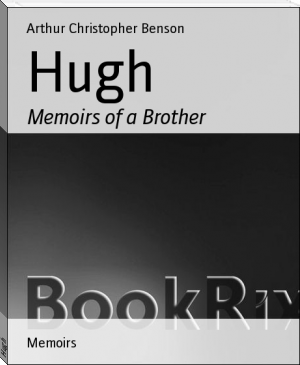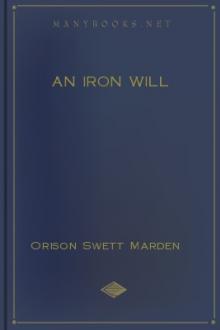Hugh by Arthur Christopher Benson (best ebook reader for ubuntu .txt) 📕

- Author: Arthur Christopher Benson
Book online «Hugh by Arthur Christopher Benson (best ebook reader for ubuntu .txt) 📕». Author Arthur Christopher Benson
It was in these days that I first perceived the extraordinary charm of both mind and manner that he possessed. In old days he had been amusing and argumentative enough, but he was often silent and absorbed. I think his charm had been developed by his new experiences, and by the number of strangers he had been brought into contact with; he had learned an eager and winning sort of courtesy, which grew and increased every year. On one point we wholly and entirely agreed--namely, in thinking rudeness of any kind to be not a mannerism, but a deadly sin. "I find injustice or offensiveness to myself or anyone else," he once wrote, "the hardest of all things to forgive." We concurred in detesting the habit of licensing oneself to speak one's mind, and the unpleasant English trait of confusing sincerity with frank brutality. There is a sort of Englishman who thinks he has a right, if he feels cross or contemptuous, to lay bare his mood without reference to his companion's feelings; and this seemed to us both the ugliest of phenomena.
Hugh saw a good deal of academic society in a quiet way--Cambridge is a hospitable place. I remember the consternation which was caused by his fainting away suddenly after a Feast at King's. He had been wedged into a corner, in front of a very hot fire, by a determined talker, and suddenly collapsed. I was fetched out to see him and found him stretched on a form in the Hall vestibule, being kindly cared for by the Master of a College, who was an eminent surgeon and a professor. Again I remember that we entered the room together when dining with a hospitable Master, and were introduced to a guest, to his bewilderment, as "Mr. Benson" and "Father Benson." "I must explain," said our host, "that Father Benson is not Mr. Benson's father!" "I should have imagined that he might be his son!" said the guest.
After Hugh had lived at Llandaff House for a year he accepted a curacy at the Roman Catholic church at Cambridge. I do not know how this came about. A priest can be ordained "to a bishop," in which case he has to go where he is sent, or "on his patrimony," which gives him a degree of independence. Hugh had been ordained "on his patrimony," but he was advised to take up ministerial work. He accordingly moved into the Catholic rectory, a big, red-brick house, with a great cedar in front of it, which adjoins the church. He had a large sitting-room, looking out at the back over trees and gardens, with a tiny bedroom adjoining. He had now the command of more money, and the fitting up of his rooms was a great delight to him; he bought some fine old oak furniture, and fitted the walls with green hangings, above which he set the horns of deer, which he had at various times stalked and shot--he was always a keen sportsman. I told him it was too secular an ornament, but he would not hear me.
Canon Scott, the rector, the kindest and most hospitable of men, welcomed me to the rectory, and I was often there; and our Sunday walks continued. Hugh became known at once as the best preacher in Cambridge, and great congregations flocked to hear him. I do not think he had much pastoral work to do; but now a complication ensued. A good many undergraduates used to go to hear him, ask to see him, discuss religious problems with him. Moreover, before he left the Anglican communion, Hugh had conducted a mission at Cambridge, with the result that several of his hearers became Roman Catholics. A certain amount of orthodox alarm was felt and expressed at the new and attractive religious element which his sermons provided, and eventually representations were made to one that I should use my influence with Hugh that he should leave Cambridge. This I totally declined to do, and suggested that the right way to meet it was to get an Anglican preacher to Cambridge of persuasive eloquence and force. I did eventually speak to Hugh about it, and he was indignant. He said: "I have not attempted, and shall not attempt, any sort of proselytisation of undergraduates--I do not think it fair, or even prudent. I have never started the subject of religion on any occasion with any undergraduate. But I must preach what I believe; and, of course, if undergraduates consult me, I shall tell them what I think and why I think it." This rule he strictly adhered to; and I do not know of any converts that he made.
Moreover, it was at this time that strangers, attracted by his sermons and his books, began to consult him by letter, and seek interviews with him. In this relation he showed himself, I have reason to know, extraordinarily kind, sympathetic, and straightforward. He wrote fully and as often as he was consulted; he saw an ever-increasing number of inquirers. He used to groan over the amount of time he had to spend in letters and interviews, and he used to say that it often happened that the people least worth helping took up the most time. He always gave his very best; but the people who most vexed him were those engaged in religious inquiry, not out of any profound need, but simply for the emotional luxury; and who argued round and round in a circle for the pleasure of being sympathised with. Hugh was very clear and practical in his counsels, and he was, I used to think, like a wise and even stern physician, never influenced by sentiment. It was always interesting to discuss a "case" with him. I do not mean that he discussed his cases with me, but I used to ask him how to deal with some intellectual or moral problem, and his insight seemed to me wonderfully shrewd, sensible, and clear. He had a masterly analysis, and a power of seeing alternatives and contingencies which always aroused my admiration. He was less interested in the personal element than in the psychological; and I used to feel that his strength lay in dealing with a case scientifically and technically. Sometimes he had desperate, tragic, and even alarming cases to deal with; and here his fearlessness and toughness stood him in good stead. He never shrank appalled before any moral enormity. He told me once of a series of interviews he had with a man, not a Catholic, who appealed to him for help in the last extremity of moral degradation. He became aware at last that the man was insane, but he spared no pains to rescue him.
When he first began this work he had a wave of deep unhappiness; the responsibility of the priesthood so overwhelmed him that for a time, I have learned, he used to pray night after night, that he might die in his sleep, if it were possible. I saw and guessed nothing of this, but I think it was a mood of exhaustion, because he never exhibited anything but an eager and animated interest in life.
One of his pleasures while he was at Cambridge and ever after was the writing, staging, and rehearsing of little mystery-plays and sacred scenes for the children of St. Mary's Convent at Cambridge and for the choir boys of Westminster Cathedral. These he thoroughly enjoyed; he always loved the companionship of children, and had exactly the right way with them, treating them seriously, paternally, with a brisk authority, and never sentimentally. They were beautiful and moving little dramas, reverently performed. Unhappily I never saw one of them. Even now I remember with a stab of regret that he came to stay with me at Cambridge for one of these, and besought me to go with him. But I was shy and busy, and though I could easily have arranged to go, I did not and he went off alone. "Can't you really manage it?" he said. "Pray-a-do!" But I was obdurate, and it gives me pain now to think that I churlishly refused, though it is a false pathos to dwell on such things, and both foolish and wrong to credit the dead with remembering trifling grievances.
But I do not think that his time at the Catholic rectory was a really very happy one. He needed more freedom; he became gradually aware that his work lay in the direction of writing, of lecturing, of preaching, and of advising. He took his own measure and knew his own strength. "I have _no_ pastoral gift," he once said to me very emphatically. "I am not the man to _prop_," he once wrote; "I can kindle sometimes, but not support. People come to me and pass on." Nor was he at ease in the social atmosphere of Cambridge--it seemed to him bleak, dry, complacently intellectual, unimaginative. He felt himself what the law describes as "a suspected person," with vague designs on the spiritual life of the place.
At first, he was not rich enough to live the sort of life he desired; but he began to receive larger incomes from his books, and to see that it would soon be in his power to make a home for himself. It was then that our rambles in search of possible houses began, while at the same time he curtailed his own personal expenditure to the lowest limits, till his wardrobe became conspicuous for its antiquity. This, however, he was wholly indifferent about; his aim was to put together a sufficient sum to buy a small house in the country, and there to settle "for ever," as he used to say. "A small Perpendicular chapel and a white-washed cottage next door is what I want just now," he wrote about this time. "It must be in a sweet and secret place--preferably in Cornwall." Or again, "I want and mean--if it is permitted--to live in a small cottage in the country; to say mass and office, and to write books. I think that is honestly my highest ideal. I hate fuss and officialdom and backbiting--I wish to be at peace with God and man." This was his dream. The house at Hare Street was the result.
XIII
HARE STREET
I have no doubt at all that Hugh's seven years at Hare Street were the happiest of his life. He generally had some companion living there--Mr. Gabriel Pippet, who did much skilful designing and artistic work with and for him; Dr. Sessions, who managed his household affairs and acted as a much needed secretary; Father Watt, who was in charge of the Hormead Mission. At one time he had the care of a little boy, Ken Lindsay, which was, I think, the greatest joy he ever had. He was a most winning and affectionate child, and Hugh's love of children was very great. He taught Ken, played with him, told him stories. Among his papers are little touching trifles which testify to his love of the child--a withered flower, or some leaves in an envelope, "flower which Ken gave me," "leaves with which Ken tried to make a crown,"





Comments (0)